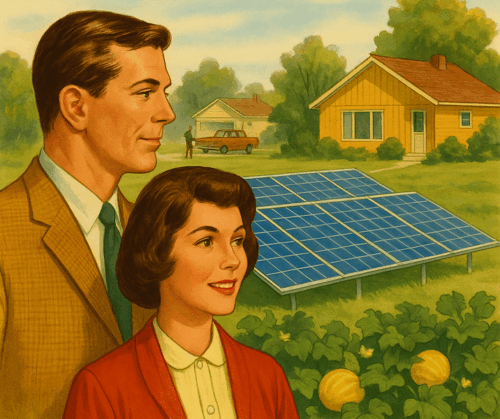When people think of solar power, rooftop panels are usually the first thing that comes to mind. But there’s another model—community solar—that allows utility customers to support renewable energy and save money without installing equipment on their property.
With community solar, you subscribe to a share of a local solar farm and receive credits on your utility bill based on the energy your share produces. This model is especially useful for renters, condo residents, and others without access to a suitable roof. There’s no need for construction or maintenance on your end.
Community Solar vs On-Site Solar
| Feature | Community Solar | On-Site Solar |
| Upfront Cost | None | Requires investment or financing |
| Installation | Off-site | Installed on your property |
| Maintenance | Handled by the provider | Your responsibility |
| Space/Shade Requirements | None | Requires usable roof or land space |
| Ownership | You subscribe to energy credits | You own (or lease) the system |
| Portability | Transferable if you move within the service area | Tied to the property |
How Community Solar Works and Who It Serves
- Community solar is available to customers with a residential rate classification on their electric meter—this includes master-metered apartment buildings.
- It is compatible with third-party electricity supply agreements and will not interfere with your choice of energy supplier.
- On average, Maryland and DC participants save around 10% on electricity costs by paying a discounted rate for solar credits.
- While the program is structured as a 20-year agreement, participants can cancel with six months’ notice, without penalties beyond any credits already applied.
- It’s important to note that there can be a lag between when solar credits are generated and when they appear on your utility bill. This sometimes causes temporary confusion, but utilities reconcile the balance at year-end to ensure accuracy.
Frequently Asked Questions About Offsite Solar
Do I still get a utility bill?
Yes. Your utility (Pepco, BGE, Delmarva, etc.) applies community solar credits to your bill. You then pay the solar subscription provider at a discounted rate—typically 90% of the value—resulting in net savings.
What if my energy use changes?
Your subscription can be adjusted to reflect changes in usage. If your consumption decreases significantly, you can modify or cancel the subscription with six months’ notice.
Can I still install rooftop solar later?
Yes. Participating in community solar doesn’t prevent you from installing a system on your property later. You can adjust or cancel your subscription at that time.
Will this affect my third-party electricity supplier?
No. Community solar operates independently of your electricity supply contract and is compatible with third-party suppliers.
Who can subscribe?
The program is open to electric customers with a residential rate classification, including master-metered multifamily buildings. Commercial rate accounts are not eligible.
Why do credits sometimes appear delayed?
There may be a timing gap between when credits are produced and when they appear on your utility bill. This is normal, and any discrepancies are trued up at the end of the year by the utility to ensure everything balances correctly.
Learn More About Your Community Solar Options
Honeydew Energy Advisors helps residents and building owners in Maryland and DC navigate solar choices, including community solar and on-site systems. If you’re exploring ways to reduce energy costs and support clean power without installing your own panels, community solar may be a good fit.
Please contact us in the form below for a free evaluation of your property!

